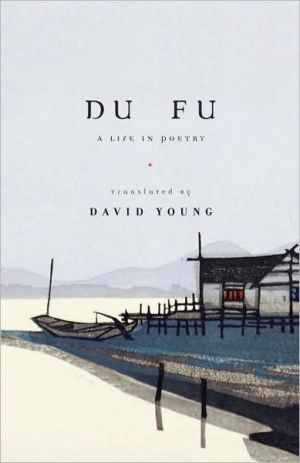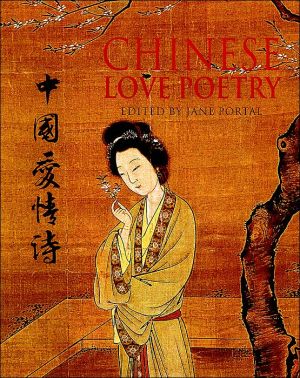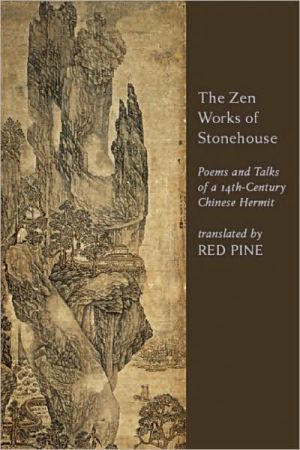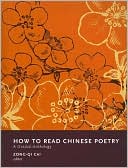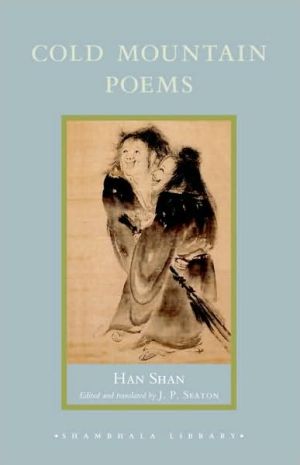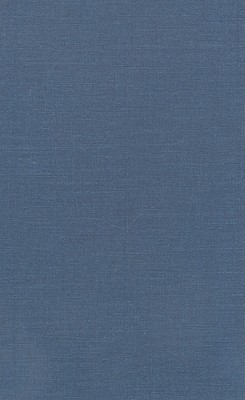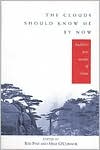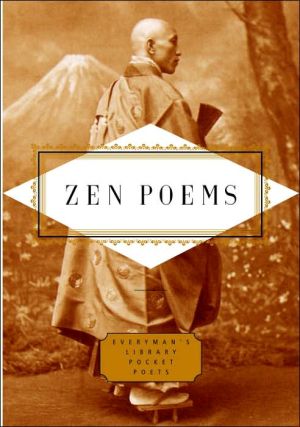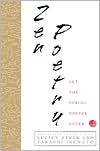Du Fu: A Life in Poetry
Du Fu (712–770) is one of the undisputed geniuses of Chinese poetry—still universally admired and read thirteen centuries after his death. Now David Young, author of Black Lab, and well known as a translator of Chinese poets, gives us a sparkling new translation of Du Fu’s verse, arranged to give us a tour of the life, each “chapter” of poems preceded by an introductory paragraph that situates us in place, time, and circumstance. What emerges is a portrait of a modest yet great artist, an...
Search in google:
Du Fu (712–770) is one of the undisputed geniuses of Chinese poetry—still universally admired and read thirteen centuries after his death. Now David Young, author of Black Lab, and well known as a translator of Chinese poets, gives us a sparkling new translation of Du Fu’s verse, arranged to give us a tour of the life, each “chapter” of poems preceded by an introductory paragraph that situates us in place, time, and circumstance. What emerges is a portrait of a modest yet great artist, an ordinary man moving and adjusting as he must in troubled times, while creating a startling, timeless body of work.Du Fu wrote poems that engaged his contemporaries and widened the path of the lyric poet. As his society—one of the world’s great civilizations—slipped from a golden age into chaos, he wrote of the uncertain course of empire, the misfortunes and pleasures of his own family, the hard lives of ordinary people, the changing seasons, and the lives of creatures who shared his environment. As the poet chases chickens around the yard, observes tear streaks on his wife’s cheek, or receives a gift of some shallots from a neighbor, Young’s rendering brings Du Fu’s voice naturally and elegantly to life.I sing what comes to me in ways both old and modernmy only audience right now—nearby bushes and treeselegant houses stand in an elegant row, too manyif my heart turns to ashes then that’s all right with me . . .from “Meandering River”Publishers WeeklyNot a biography, but instead a very coherent book of free translations, this new volume translated by Young (Black Lab) gives the sense of a life as lived, a life that belongs at once to Du Fu (712-770, also called Tu Fu) and to any sympathetic reader who has experienced beauty in nature, disillusion in politics, or love and trouble at home. These 168 poems, along with clear footnotes, also create a sense of the poet's own times. Du Fu began his poetic career as a bachelor writing beautiful seasonal poetry, a close friend of the great, and slightly older, poet Li Bai (Li Po). "Autumn again and you and I/ are thistledown in the wind," he told his friend in one early poem. But Du Fu married and began a family, and then, seeking noble patrons, had to travel through war zones. He wrote, in consequence, poems about conscription, battle, poverty and loneliness: "on my face new tears/ are running down familiar tracks." Search for secure employment later on brought him to far-flung provincial towns, where he produced his most tranquil verse: "here comes some tea and sugarcane juice/ brought down from the house." (Nov.)Copyright © Reed Business Information, a division of Reed Elsevier Inc. All rights reserved.
17. REMEMBERING LI BAI ON A SPRING DAYI know no poetry to equal hishis mind must be uniquefreshness of Yu XinBao Zhao’s delicacyas I watch the trees leaf outhere, north of the Weihe’s probably gazing at sunsetthere, east of the Yangziwhen can we sharea pot of wine againtalk on and on about poetryuntil it’s nearly daybreak?21. FRIENDSHIPA flick of the handand it’s rain or stormwherever I lookchange and ficklenessthe old ideal of friendshipas loyalty and permanencehas turned into dirtunder our feet.23–24. A SUMMER OUTINGIHow nice to board the bargeas the sun meets the horizonthe breeze picks upthe water rippleswe sail past grovesof thick bambooand anchor in the coolof water liliesthe young men mixsome icy drinksthe girls are slicinglotus rootsbut the clouds right overheadgrow blackrain makes me rushmy poem.IIThe shower wets the bencheswe were sitting onthe wind blows hardand rocks the boatthe southern girls’red skirts drenchedthe northern beautiesseem to have ruined their makeupthe mooring linesaws and cuts the willowthe barge’s curtains are soakedfrom breaking wavesour going homewill be wet and chillyas if we were having autumnright in the heart of summer.
1. Early Years in the East, 737–7441. Writing Poems After Dinner at the Zuos’ 2. On the Tower at Yanzhou 3. Gazing at Mount Tai 4. Fang’s Amazing Horse 5. A Painting of a Falcon 6. A Winter Visit to the Temple of “His Mystical Majesty” North of Luoyang 7. Mr. Song’s Deserted Villa 8. Visiting the Fengxian Monastery 9. For Li Bai 10–11. I Write Two Poems On the Wall at Zhang’s 12. Feast at Stone Gate with Liu and Zheng 13. To Li Bai 14. Li Bai and I Visit the Hermit Fan 2. Back at the Capital, 745–75015. Thinking of Li Bai On a Winter Day 16. What a Night! 17. Remembering Li Bai On a Spring Day 18. Answer to a Letter From My Brother About the Floods 19. Eight Gods of the Wine Cup 20. Meipi Lake 21. Friendship 22. Farewell to Kong Chaofu 23–24. A Summer Outing 25. Leyou Park 3. War and Rebellion, 750–75526. Song of the War Carts 27–30. From Serving at the Front 31–34. From Visiting General He 35. New Year’s Eve at Du Wei’s 36–38. From Back at General He’s 39. Climbing the Buddhist Pagoda 40–42. Meandering River 43. Gorgeous Women 44–46. Sighing Over the Autumn Rains 47. I Finally Get a Post 48. Five Hundred Words About My Journey to Fengxian N4. Trapped in the Capital, 756–75849. Moonlight Night 50. The Battle at Chentao 51. Facing Snow 52. News of My Brothers 53. Spring Scene 54. Thinking of My Son 55. In the Abbot’s Cell 56. the Pengya Road 5. Reunion and Recovery, 758–75957. Jade Flower Palace 58–60. Qiang Village Poems 61. From the Journey North62–63. Meandering River 64. Too Much Heat and Too Much Work 65. Dreaming of Li Bai 66. In the City on Business I Meet One Friend and We Spend the Night Eating and Drinking At the House of Another 6. On the Move, 75967. Thinking of My Brothers On a Moonlit Night 68–71. Qinzhou Poems 72. Thirty Bundles of Shallots 73. Abbot Zan 74. New Moon 75. Looking Out at the Plain 76. She Thinks of Him While Pounding Laundry 77. The Cricket 78. Leaving Qinzhou 79–85. The Tonggu Songs 86. Leaving Tonggu 7. Thatched Cottage, 759–76287. Chengdu City 88. Siting a House 89. I Become a Farmer 90. River Village 91. Poling a Skiff 92. A Guest 93. Retirement 94. I Am a Madman 95. An Autumn Storm and Our Thatched Roof 96. Rain on a Spring Night 97–103. Seven For the Flowers Near the River 104–112. Random Feelings 113. Sundown Song 8. More Disruptions, 762–765114. At Fengji Station: Second Farewell to Yan Wu 115. Song of My Friendship With Vice Prefect Yan 116. Sent to Be Written on the Wall of My Thatched Cottage 117. Good News About the War 118. Two Swallows 119. Saying Good-Bye at Fang Guan’s Grave 120. Climbing the Tower 121. Spending the Night at Headquarters 122. Weary Night 123–126. From Spring in the River Village 9. East to Kuizhou, 765–766127. Farewell to Mr. Zhang 128. Moving to Kuizhou City 129. The Women Who Gather Firewood 130. The Tied-Up Chickens 131. Song For an Ancient Cypress 132. Overnight at the River Pavilion 133. Watching the Rain From the West Apartment 134–141. Autumn Thoughts 142. Filling in the Time 143. A Parrot 144. Night at the West Apartment 145. Old and Sick 10. the Gentleman Farmer, 767–768146–147. Spring 148. Watching Fireflies 149–153. Five Poems on the Autumn Fields154–155. Back and Forth Between Nang-West and East Village 156. Thinking About My Brother 157. September Full Moon 158. Note for Mr. Wu 159. From a Height 160. Drunk, I Fell Off My Horse 161. Deaf 162–163. Thoughts and Feelings 164. Giving Away My Orchard 11. Last Days165. Night Thoughts Traveling 166. Drinking in the Library 167. Mourning Li Zhifang 168. Yueyang Tower 169. White Horse 170. Ready to Go Acknowledgments Selected Bibliography
\ Publishers WeeklyNot a biography, but instead a very coherent book of free translations, this new volume translated by Young (Black Lab) gives the sense of a life as lived, a life that belongs at once to Du Fu (712-770, also called Tu Fu) and to any sympathetic reader who has experienced beauty in nature, disillusion in politics, or love and trouble at home. These 168 poems, along with clear footnotes, also create a sense of the poet's own times. Du Fu began his poetic career as a bachelor writing beautiful seasonal poetry, a close friend of the great, and slightly older, poet Li Bai (Li Po). "Autumn again and you and I/ are thistledown in the wind," he told his friend in one early poem. But Du Fu married and began a family, and then, seeking noble patrons, had to travel through war zones. He wrote, in consequence, poems about conscription, battle, poverty and loneliness: "on my face new tears/ are running down familiar tracks." Search for secure employment later on brought him to far-flung provincial towns, where he produced his most tranquil verse: "here comes some tea and sugarcane juice/ brought down from the house." (Nov.)\ Copyright © Reed Business Information, a division of Reed Elsevier Inc. All rights reserved.\ \
